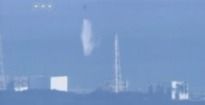Water Drop Fails to Cool Reactor
Attempts to cool down a stricken reactor at the Fukushima Daiichi nuclear plant in Japan have suffered an early setback after seawater dumped from the air failed to bring down radiation levels.
Radiation readings taken 20 minutes after self-defence force helicopters doused the plant's No 3 reactor on Thursday remained unchanged, Tokyo Electric Power [Tepco] said, according to Kyodo news agcncy.
The use of Japanese military helicopters to drop seawater onto the plant's reactor marked the opening of a new front in the battle to avert nuclear meltdown.
TV footage showed the CH-47 Chinook helicopters dousing the No 3 reactor in an attempt to cool an overheating pool for spent fuel rods and prevent it from releasing dangerous radioactive steam.
Two helicopters, flying at less than 300 feet, dumped four loads of water on the reactor, although the footage suggested a significant quantity was missing the target.
The ministry said it planned to release at least 12 more loads in the 40 minutes that each crew can remain in the area before experiencing limited radiation exposure.
The aim of the operation is twofold: to cool the reactor and replenish a pool containing spent fuel rods. Although Tepco has been unable to take precise measurements, the pool is thought to be almost empty of water, raising the risk that the fuel rods will overheat and melt.
Earlier, Gregory Jackzo, the chairman of the US nuclear regulatory commission, told a congressional hearing in Washington that the storage pool at another reactor had lost all of its water and was in danger of spewing more radioactive material.
"We are afraid that the water level at [the No 4 reactor] is the lowest," said Hikaru Kuroda, a Tepco official. But he added, "Because we cannot get near it, the only way to monitor the situation is visually from far away."
At lunchtime on Thursday the police stood ready to spray the No 3 reactor from 11 water cannon trucks, as the focus of the crisis shifted from overheating reactors to the potentially more dangerous predicament of the storage pools.
The roofs of the No 3 and No 4 reactors were blown away by hydrogen explosions earlier this week, depriving them of a last line of defence against potentially dangerous radiation leaks.
In the worst-case scenario, overheating fuel rods could heat up to the point where they begin to melt and release high levels of radioactivity.
Click here to read more.


